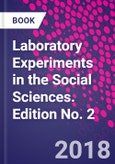While there are many books available on statistical analysis of data from experiments, there is significantly less available on the design, development, and actual conduct of the experiments. Laboratory Experiments in the Social Sciences summarizes how to design and conduct scientifically sound experiments, be they from surveys, interviews, observations, or experimental methods. The book encompasses how to collect reliable data, the appropriate uses of different methods, and how to avoid or resolve common problems in experimental research. Case study examples illustrate how multiple methods can be used to answer the same research questions and what kinds of outcome would result from each methodology. Sound data begins with effective data collection. This book will assist students and professionals alike in sociology, marketing, political science, anthropology, economics, and psychology.
Table of Contents
Part I Designing and Conducting Experiments 1. Why Do Experiments? 2. Ethics and Experiments 3. Logical and Philosophical Foundations of Experimental Research in the Social Sciences 4. Training Interviewers and Experimenters 5. Human Participants in Laboratory Experiments in the Social Sciences 6. Developing Your Experiment 7. Common Problems and Solutions in Experiments
Part II Experiments Across the Social Sciences 8. Laboratory Experiments in Sociology 9. Experiments on Exchange Relations and Exchange Networks in Sociology 10. Social Dilemma Experiments in Sociology, Psychology, Political Science and Economics 11. Hypotheses, Operationalizations, and Manipulation Checks 12. The Standardized Experimental Situation in Expectation States Research: Notes on History, Uses, and Special Features 13. Experimental Political Science 14. Voting and Agenda Setting in Political Science and Economics 15. Economic Games for Social Scientists 16. Solving Coordination Problems, Experimentally 17. Experimental Studies of Media Stereotyping Effects 18. Judgment and Decision-Making 19. Experiments in Organizational Behavior
Part III Applied Research and Proposals 20. Conducting Applied Experimental Research 21. Funding Experiments, Writing Proposals








